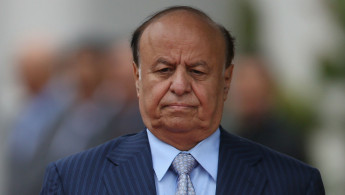Is the president of Yemen under house arrest in Saudi Arabia?
While Hadi has been referred to as the exiled president, he quite likely could now be described as the "detained president". On Sunday, March 12, Yemeni minister Salah Alsiady posted a statement on his Facebook account, calling on Yemenis to stage protests calling for the president's return from Riyadh.
"All Yemenis are required to demonstrate and go on a sit-in for the sake of President Hadi's return to Yemen. Otherwise, be prepared for historic tragedies… Lebanon restored its [prime minister] within days, but we the people of faith and wisdom are at a loss," said Alsiady.
In his statement, the minister referred to Saad al-Hariri, Lebanon's prime minister, who resigned from his job upon his visit to Saudi Arabia last year. Hariri was believed to have been held by Riyadh on political grounds.
Alsaidy's move was unprecedented and apparently courageous. It hints that President Hadi cannot carry out his mind's desires, or do what he thinks should rightfully be done for Yemen.
Alsiady deems victory over the Houthi group inevitable but subject to Hadi leaves Saudi Arabia behind. "If we lobby for President Hadi's return, I assure you that the Iran-allied militias in Yemen will be badly defeated," he said.
 |
The true status of President Hadi has been clouded in recent months and years |  |
Hadi fled from Aden to Saudi Arabia in March 2015 in the wake of the Houthi advance to the south. The Houthis were forced back from Aden a few months later, that July. Since then, President Hadi has only made brief visits to Aden - a city lying under the control of pro-government forces, separatists and the Saudi-led coalition.
His last visit to Yemen was in February 2017.
House arrest?
The true status of President Hadi has been clouded in recent months and years. While some say the president cannot return to Aden because of the unstable security situation, others contend that Hadi is under house arrest, and he could not take action without Riyadh's say-so.
At a time when Hadi and the Saudi leadership display no differences on the surface, Yemenis have grown sceptical - and furious - over the president's position.
"Hadi and his government chose to be in this position," said Fathi Bin Lazrq, a Yemeni journalist. "They have put themselves in this humiliating situation. They are the ones who loosen their grip and succumb. They are the ones who have brought themselves to these positions."
Many Yemenis believe that the Saudi-led Arab coalition has marginalised President Hadi and his government, and the coalition is only using the president's legitimacy to continue airstrikes and cover up the coalition's repeated massacres of civilians in many areas.
Reports had previously emerged that Saudi Arabia placed Yemen's president and his government under house arrest.
In November 2017, Associated Press reported that Yemen's president, his sons, ministers and military officials, had all been barred from returning home for months.
The agency quoted an unnamed military commander as saying: "When Hadi asks to go, they respond it's not safe for him to return, as there are 'plotters' who want to take his life, and the Saudis fear for his life."
Although it is true that havoc has been widespread in Yemen for the past three years, the coalition's massive forces could have secured the president's return and residence in Aden instead of holding him indefinitely in Riyadh.
 |
After the expulsion of the occupation and the overthrow of Saudi Arabia-UAE's hegemony, we will continue to demand to bring them to court for massacres and crimes of genocide that have been committed against our people |  |
Saviours-turned-occupiers
The Yemeni government does not have absolute authority in areas in which the Saudi-led coalition forces are stationed. The coalition's influence in Yemen's affairs has led many commentators here to call the coalition countries - particularly Saudi Arabia and the UAE - occupiers.
On Monday, Yemeni Nobel Peace laureate Tawakkol Karman also described the Saudi-UAE presence as an occupation.
"After the expulsion of the occupation and the overthrow of Saudi Arabia-UAE's hegemony, we will continue to demand to bring them to court for massacres and crimes of genocide that have been committed against our people," Karman said.
Moreover, President Hadi himself was quoted last year as saying the UAE behaves in Yemen as an "occupier".
The power wielded by Saudi Arabia and the UAE is clear; any Yemeni government official who opposes the coalition's agenda is not be tolerated.
After calling for Hadi's return, local media reported that Aden-based Alsiady was headed to Cairo upon receiving orders from the Saudi-led coalition. On Tuesday on his Facebook page, he wrote: "My beloved city, Aden, I bid you farewell while grief and pain is in my heart. But I will come back to you. I will not be away for long."
Some Yemeni political pundits predict that Yemen will not heal its wounds as long as regional powers are on its soil.
"Whoever thinks Saudi Arabia will bring triumph to the legitimate government, it is like betting on the dead," said Adel Doshela, a Yemeni writer and researcher.
"As it seems, UAE and Saudi Arabia see their interest in transforming Yemen into small cantons to control the game… The victim is the Yemeni civilian."
Khalid Al-Karimi is a freelance reporter and translator. He is a staff member of the Sanaa-based Yemeni Media Center and previously worked as a full-time editor and reporter for the Yemen Times newspaper.



